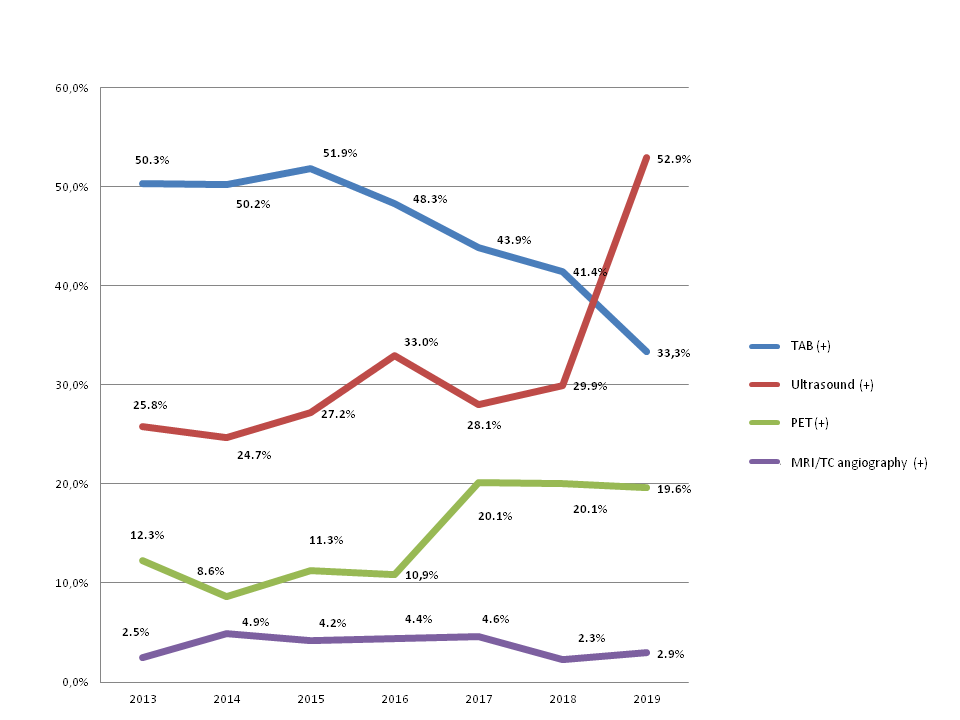Session Information
Date: Monday, November 8, 2021
Session Type: Poster Session C
Session Time: 8:30AM-10:30AM
Background/Purpose: Giant cell arteritis (GCA) is the most common systemic vasculitis over 50 years of age. Classically, GCA was assimilated with the involvement of the temporal arteries and a biopsy of these arteries (TAB) was used for its diagnosis. Although the risk of developing aortic aneurysms and large vessel involvement in this disease was well known, the study of the large vessels was not included in the standard diagnosis process. Nowadays, with the incorporation of imaging techniques, the diagnosis of GCA extracranial forms is more and more frequent. The objective of this study was to determine the frequency of cranial and extracranial vessel involvement in our population with GCA.
Methods: ARTESER is a multicenter observational retrospective study promoted by the Spanish Society of Rheumatology with 26 participating centers and in which patients diagnosed with GCA between June 1 2013 and March 29 2019 were included. The gold standard for the diagnosis of the disease was the opinion of the responsible physician according to the clinical, analytical, imaging and TAB data available. This analysis includes the data collected from TAB and imaging (ultrasound, PET, and MRI/CT-angiography) as support to classify the patient as having a cranial and/or extracranial GCA subtype.
Results: 1675 patients with GCA were included. Mean age ± SD was 76.9 ± 8.1 years and gender distribution was 1178 (70.3%) women and 497 (29.7%) men. From the data collected, it was found that 1091 patients had cranial involvement, 331 extracranial involvement and 170 patients had mixed involvement (cranial and extracranial). The Figure 1 shows how the frequency of extracranial involvement has increased in recent years, coinciding with the increase of the use of imaging tests in diagnosis. The Figure 2 shows how the ultrasound diagnosis increased from 25.8% in 2013 to 52.9% in 2019, and PET increased from 12.3% in 2013 to 19.6% in 2019. TAB was performed in the 46.3% of the patients and contributed to the diagnosis of cranial forms. Since imaging tests were not performed in all patients, and that the increase in their use is directly related with the increase in the diagnosis of forms with extracranial large vessel involvement, it is likely that the frequency of large vessel GCA increases by the next years. As a limitation, it should be noted that the subtype of vascular involvement was not detailed in 253 patients.
Conclusion: The forms with cranial involvement are the most frequent in GCA. The diagnosis of large vessel GCA has increased in recent years in direct relation to the increase in the diagnostic use of imaging tests. The diagnosis of extracranial vessel involvement it is likely to increase in the coming years.
 Evolution of GCA subtypes cranial and extracranial along the time
Evolution of GCA subtypes cranial and extracranial along the time
 GCA: Temporal evolution of diagnostic tests
GCA: Temporal evolution of diagnostic tests
To cite this abstract in AMA style:
De Miguel E, Sánchez-Costa J, Narvaez J, gonzalez-Gay M, Garrido-Puñal N, Estrada-Alarcon P, Melero-González R, Fernández-Fernández E, Silva-Diaz M, Belzunegui J, Moriano C, Sánchez J, Lluch J, Calvo I, Aldasoro V, León-Mateos L, Loricera García J, Ruíz-Román A, Valero-Martínez C, Moya P, Tortosa-Cabañas M, Navarro-Angeles V, Galisteo C, Riveros-Frutos A, Román-Ivorra J, Labrada-Arrabal S, Vasques-Rocha M, Iñiguez-Ubiaga C, García-González M, Blanco R. Giant Cell Arteritis Subtypes: Data from the ARTESER Registry [abstract]. Arthritis Rheumatol. 2021; 73 (suppl 9). https://acrabstracts.org/abstract/giant-cell-arteritis-subtypes-data-from-the-arteser-registry/. Accessed .« Back to ACR Convergence 2021
ACR Meeting Abstracts - https://acrabstracts.org/abstract/giant-cell-arteritis-subtypes-data-from-the-arteser-registry/
